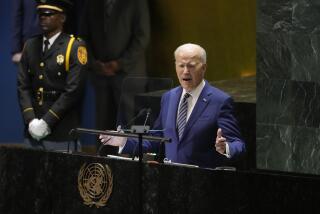Shultz Assails Kremlin on Long List of Issues
- Share via
UNITED NATIONS — Secretary of State George P. Shultz, addressing the opening session of the U.N. General Assembly, accused the Soviet Union and its allies Monday of colonialism, tyranny, propaganda and religious persecution.
But he said the United States would “more than match” any Soviet gesture of good will at the forthcoming summit in Geneva.
Shultz attacked Soviet foreign policy from Afghanistan to Central America, chided Moscow on human rights abuses at home and contended that the Soviets are blocking progress on arms control.
His speech contained no new proposals. It was intended as a rebuttal to what Washington considers a Soviet propaganda offensive in advance of the Nov. 19-20 meeting of President Reagan and Soviet leader Mikhail S. Gorbachev.
Shevardnadze Replies Today
Soviet Foreign Minister Eduard A. Shevardnadze will reply today when he addresses the General Assembly. Shevardnadze was in New York on Monday but was not present for Shultz’s speech.
Shultz and Shevardnadze are scheduled to talk privately Wednesday in New York, and the Soviet foreign minister plans to meet the President at the White House on Friday to put the finishing touches on plans for the Reagan-Gorbachev meeting.
“The United States and the Soviet Union now have an historic opportunity to reduce the risk of war,” Shultz said. “President Reagan looks forward to his meeting with General Secretary Gorbachev in November. . . . Soviet acts of good faith and willingness to reach fair agreements will be more than matched on the American side.”
In contrast to White House efforts to avoid raising expectations for the summit, Shultz said the United States hopes for a “productive meeting” that will advance relations between the two countries across the board.
He said Moscow is to blame for East-West tension and for the lack of progress at U.S.-Soviet arms negotiations in Geneva.
‘Legitimate Soviet Concerns’
“We have offered trade-offs and made clear our readiness to take account of legitimate Soviet concerns,” he said. “Progress at Geneva has been slow. Thus far, the Soviet Union has not negotiated with the responsiveness that the talks require.”
Responding to Soviet charges that U.S. “Star Wars” research program is the main sticking point in the negotiations, Shultz said that Moscow’s military space program is older and more comprehensive than Washington’s.
“The Soviet leaders know full well their own efforts in these fields,” he said. “Their propaganda about American programs is blatantly one-sided and not to be taken seriously.”
As for the U.S. plan for a space-based defense system, Shultz said, “Our goal is not to achieve superiority but to add to the security of both sides.”
The annual American and Soviet presentations at the start of the U.N. session traditionally set the terms for East-West relations in the coming months. This year, with the first U.S.-Soviet summit since former President Jimmy Carter met with the late Leonid I. Brezhnev in 1979 less than two months away, the speeches take on added significance.
Unsparing Criticism
Shultz was unsparing in his criticism of Moscow, often attempting to draw sharp moral distinctions between the United States and the Soviet Union.
He cited what he called religious and political persecution of “Solidarity trade unionists in Poland; Jews, Baptists, Roman Catholics, Pentecostalists and others in the Soviet Union. . . .
“With all the men and arms at their disposal, what are these governments afraid of?” he asked.
At the same time, Shultz praised the insurgents fighting the leftist governments of Nicaragua, Afghanistan, Cambodia and Angola. He referred to them as “national liberation movements,” employing a title more frequently used at the United Nations to describe leftist guerrilla groups.
‘Doomed to Fail’
“The reality of the democratic revolution is demonstrated by the rise of national liberation movements against Communist colonialism,” he said. “Unlike the old European empires that came to accept the postwar reality of self-determination and national independence, the new colonialists are swimming against the tide of history. They are doomed to fail.”
He saved his harshest criticism for the government of Nicaragua, which he said “betrayed the 1979 revolution and embarked on a course of tyranny at home and subversion against . . . (its) neighbors.”
He said that regional peace in Central America is impossible unless the Managua regime agrees to share power with the rebels, or contras.
More to Read
Sign up for Essential California
The most important California stories and recommendations in your inbox every morning.
You may occasionally receive promotional content from the Los Angeles Times.













